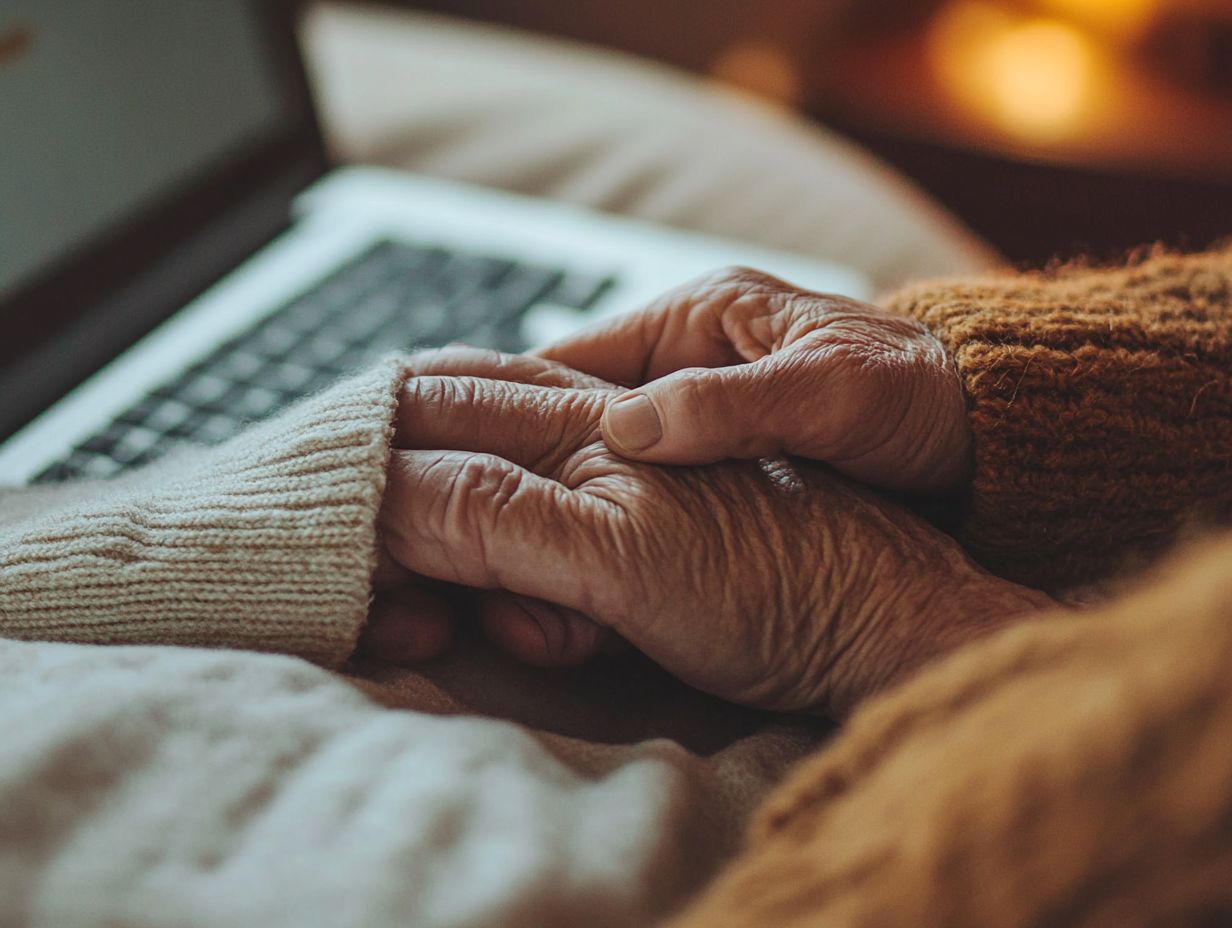Caring for cancer patients is a demanding task, requiring emotional resilience, practical skills, and access to a variety of resources. Fortunately, the internet offers numerous online resources for family caregivers, providing essential support, information, and cancer diagnoses details. Here’s a look at ten valuable resources that can enhance caregivers’ abilities to support their loved ones, including cancer survivors:
- Support Groups for Caregivers: Organizations like the Cancer Support Community offer emotional support and caregiving resources, fostering better care quality and addressing caregiver stress.
- Online Forums and Communities: Platforms such as CaringBridge allow family caregivers to connect, share experiences, enhance communication skills, and reduce isolation during the cancer journey.
- Educational Websites: Resources from the American Cancer Society and the National Cancer Institute provide crucial information on cancer treatments, caregiving responsibilities, and the caregiver role.
- Financial Assistance Programs: Grants and advice from organizations like CancerCare and the National Alliance for Caregiving help manage caregiving financial challenges, including medication costs and insurance issues.
- Online Counseling Services: These services offer mental health support to family caregivers, addressing caregiver stress, emotional challenges, and enhancing psychological well-being.
- Caregiver Blogs and Personal Stories: Blogs like “The Caregiver Space” and “Cancer Compass” provide practical advice, shared caregiving experiences, and coping strategies.
- Telemedicine and Virtual Support: Telemedicine offers remote access to healthcare systems, improving coordination, decision-making, and quality of care by involving the health-care team.
- Self-Care Resources for Caregivers: Strategies for stress management, self-care, and mental health maintenance, including mindfulness and exercise to support spiritual health.
- Nutrition and Meal Planning Services: Tailored meal plans and workshops help caregivers meet cancer patients’ nutrition needs and support their dietary guidelines during cancer care.
- Legal Aid and Advocacy Groups: These groups provide information on caregiver rights, patient navigation, and legislative support, helping address health disparities and access to care.
These resources empower family caregivers with the knowledge and support necessary to navigate the complexities of cancer care, ensuring both their own well-being and that of their loved ones, ultimately improving the caregiving experience.
Key Takeaways:
1. Support Groups for Caregivers

Support groups for caregivers provide emotional support, allowing family caregivers to share experiences, access community resources, and manage caregiving stress.
Organizations like the Cancer Support Community offer structured environments for caregivers to express feelings and receive support.
Support groups help improve caregivers’ well-being and enhance care quality for patients.
2. Online Forums and Communities
Online forums and communities provide family caregivers with a platform to share experiences, gain support, and develop communication skills related to the cancer journey.
These platforms, such as CaringBridge and Cancer Support Community, offer family caregivers a space to ask questions, share resources, access emotional support, and connect with health professionals.
Participation helps reduce isolation and build resilience for managing caregiving challenges.
3. Educational Websites
Educational websites, like those from the American Cancer Society and National Cancer Institute, provide cancer diagnosis and treatment information to help family caregivers support loved ones.
These websites offer insights into cancer treatments such as:
- surgery
- radiation
- medication
They also address caregiving responsibilities, communication skills, and emotional support with practical tips for daily management.
4. Financial Assistance Programs
Financial assistance programs provide support to family caregivers by covering costs related to medication, insurance, medical appointments, and patient assistance programs during cancer care.
Organizations like CancerCare, the Patient Advocate Foundation, and the National Cancer Institute offer grants, resources, and advice tailored to caregivers’ needs.
These programs help manage financial challenges and enhance caregivers’ focus on their loved ones’ health.
5. Online Counseling Services
Online counseling services provide family caregivers with mental health support to manage caregiver stress and improve emotional well-being.
These services are accessible from home, allowing caregivers to connect with professionals without transportation or scheduling conflicts.
Online counseling addresses caregiver challenges like burnout, anxiety, and isolation through professional guidance and coping strategies.
Caregivers learn communication strategies, emotional regulation, and self-care practices, enhancing their mental health and the quality of care for loved ones, involving advanced care and multidisciplinary oncology teams.
6. Caregiver Blogs and Personal Stories
Caregiver blogs and personal stories provide emotional support and practical advice for family caregivers of cancer patients.
These blogs offer a platform where caregivers share experiences, vent frustrations, and seek advice from others in similar situations.
Examples include:
- “The Caregiver Space,” which provides articles on coping strategies and managing caregiver stress,
- “Cancer Compass,” where caregivers share personal challenges and triumphs.
By exchanging stories and advice, these blogs create a supportive network for caregivers.
7. Telemedicine and Virtual Support

Telemedicine and virtual support allow family caregivers to access health systems remotely, coordinating medical appointments and communications from home.
Telemedicine saves time, removes travel stress, and provides access to specialized medical expertise without geographical limits.
Digital tools improve communication between caregivers and healthcare teams, enhancing decision-making and care strategies.
Caregivers gain support and give the power to implement advanced care strategies, improving their effectiveness in managing loved ones’ care, while engaging with medical social workers and oncology social workers.
8. Self-Care Resources for Caregivers
Self-care resources for family caregivers offer strategies and tools to manage stress and maintain mental health.
Resources include mindfulness practices, regular exercise, and hobby engagement to reduce anxiety and improve mood.
Support groups and professional counseling provide emotional support and coping mechanisms, addressing psychological well-being and spiritual health.
Prioritizing self-care enhances caregivers’ resilience and balance in their roles.
9. Nutrition and Meal Planning Services
Nutrition and meal planning services support family caregivers by addressing the nutritional needs of cancer patients.
These services create tailored meal plans focusing on essential nutrients and specific dietary restrictions during treatment.
Caregivers can use local community resources like nutrition workshops and cancer support groups for expert guidance to address cancer statistics and nutrition support.
Organizations like the American Cancer Society and CancerCare offer cooking classes for preparing nourishing meals for cancer patients, addressing specific nutrition needs.
Leveraging these resources ensures cancer patients receive proper nutritional support during treatment.
10. Legal Aid and Advocacy Groups
Legal aid and advocacy groups support family caregivers by providing information about caregiver rights, navigating insurance issues, and accessing community organizations and support services during the cancer journey.
They help caregivers understand legislation like the Family and Medical Leave Act, allowing caregivers to take time off work without losing their job.
These organizations guide caregivers through healthcare system complexities, enabling informed decisions that benefit both the caregiver and patient.
Legal aid and advocacy create a network ensuring caregivers are supported in their challenging journey.
What Are the Key Responsibilities of a Caregiver for a Cancer Patient?
Caregiver responsibilities for a cancer patient include providing emotional support, managing health information, coordinating medical appointments, and overseeing daily caregiving activities.
Caregivers also handle medication management, nutritional support, symptoms management, and assist with daily tasks like bathing and dressing.
How Can Online Resources Help Caregivers?
Online resources help caregivers by providing access to health information, support networks, and community organizations.
These resources include:
- Online forums
- Educational materials
- Community outreach programs
These initiatives support caregivers in sharing experiences, overcoming caregiving challenges, learning caregiving skills, and connecting with local services, such as respite care and community organizations.
Webinars and interactive tools assist caregivers in managing health conditions and daily responsibilities.
What Are the Benefits of Joining a Support Group for Caregivers?

Joining a support group for caregivers provides emotional support, shared experiences, and coping strategies to reduce stress and improve psychological well-being.
Support groups offer a platform for caregivers to connect with others who understand caregiving challenges and share insights about treatment options.
Resources such as educational materials and workshops available through support groups ease caregiving burdens.
Caregivers benefit from forming support networks that offer camaraderie and practical assistance.
How Can Caregivers Educate Themselves on Cancer and Its Treatment?
Caregivers can educate themselves on cancer and its treatment by using resources from the American Cancer Society and the National Cancer Institute.
Caregivers can enroll in online cancer education courses for flexible learning, gaining vital health information and knowledge about cancer treatment and diagnoses.
Workshops provide hands-on experience and direct interaction with healthcare professionals, including advanced practitioners and the multidisciplinary oncology team, enhancing the quality of care.
Credible websites offer articles and videos on managing symptoms, emotional well-being, and providing emotional support, aiding caregivers in their responsibilities.
Educated caregivers can better support their loved ones through the cancer journey, enhancing the caregiving experience and improving the quality of care.
What Financial Assistance Programs Are Available for Caregivers?
Financial assistance programs for caregivers include:
- Grants
- Scholarships
- Aid from non-profit organizations like United Way, Cancer Care Foundation, and National Alliance for Caregiving
These programs help cover costs such as medical bills, transportation, medication costs, and respite care.
Caregivers can apply for financial assistance online or through direct contact with organizations, including patient assistance programs and community resources.
How Can Caregivers Take Care of Their Own Mental and Emotional Well-Being?
Caregivers can maintain their mental and emotional well-being by prioritizing self-care, spiritual health, and seeking support from friends, family, or professionals.
Self-care activities include mindfulness, regular exercise, and spiritual health practices, which help reduce anxiety and improve mood.
Counseling offers tools for managing caregiver stress, ensuring caregivers address their emotional needs to support others effectively.
What Are Some Tips for Balancing Caregiving and Self-Care?
Balancing caregiving and self-care involves prioritizing time management, setting boundaries, and seeking support resources.
Caregivers should recognize the importance of self-care to prevent burnout.
Efficient time management helps prioritize tasks, delegate duties, and ensure personal needs are met.
Setting boundaries around caregiving hours allows time for self-care activities like hobbies, relaxation, and coping strategies to manage caregiving challenges.
Utilizing community resources, such as respite care, support groups, and nutritional support, provides support and reduces stress.
How Can Caregivers Find Support and Resources for Meal Planning and Nutrition?
Caregivers can find support and resources for meal planning and nutrition through community organizations, specialized programs, online services, and health professionals focused on nutrition needs.
Community organizations offer workshops and classes on nutrition and nutrition support for cancer survivors and those undergoing cancer care.
Specialized programs provide personalized meal plans from nutritionists and registered dietitians, tailored to meet specific nutrition needs and dietary requirements.
Online services offer information and recipes for meal preparation.
These resources help caregivers meet dietary needs and reduce stress.
What Legal Issues Should Caregivers Be Aware Of?

Caregivers should be aware of legal issues related to caregiver rights, labor laws, privacy regulations, and insurance issues.
Key legal issues include understanding rights under the Family and Medical Leave Act, compliance with overtime and work hour regulations, and adherence to patient privacy laws like the Health Insurance Portability and Accountability Act (HIPAA).
Caregivers must ensure proper handling of sensitive information, adhere to health systems regulations, and seek guidance from legal resources for support.
How Can Caregivers Advocate for Their Loved Ones and Themselves?
Caregivers advocate for their loved ones and themselves by communicating effectively with their health-care team, understanding healthcare systems, and addressing insurance issues efficiently.
Advocacy involves learning patient rights, accessing support resources such as the Institute of Medicine guidelines, and maintaining open dialogue with medical professionals.
Proactive advocacy ensures caregivers and their loved ones receive the best possible care by improving access to care and addressing health disparities.
Frequently Asked Questions
What are some of the best online resources for caregivers of cancer patients, including those from the National Cancer Institute and the American Cancer Society?
Some popular and highly recommended online resources for caregivers of cancer patients include CancerCare, Caregiver Action Network, and the National Comprehensive Cancer Network.
Are there any online support groups specifically for caregivers of cancer patients?
Yes, there are several online support groups specifically for caregivers of cancer patients, such as Cancer Support Community, CancerCare Connect, and Caregiver Action Network’s virtual support group, which also help address mental health and psychological well-being.
Can I find resources that offer financial assistance for caregivers of cancer patients?
Yes, there are online resources that offer financial assistance for caregivers of cancer patients, such as CancerCare’s financial assistance program and the Patient Advocate Foundation’s financial aid fund.
What online resources can provide information about the emotional and mental health of caregivers of cancer patients?
Online resources such as the National Cancer Institute, Cancer Support Community, and American Cancer Society offer information and support for the emotional and mental health of caregivers, addressing their psychological well-being and caregiver stress.
Are there any online resources that offer tips and advice for caregivers of cancer patients?
Yes, there are many online resources that offer tips and advice for caregivers of cancer patients, including Cancer Support Community’s Caregiver Toolkit, CancerCare’s Caregiver Resource Guide, and the American Cancer Society’s Caregiver Support Center.
Can I find online resources that provide practical help for caregivers of cancer patients?
Absolutely, there are online resources that offer practical help for caregivers of cancer patients, such as the National Cancer Institute’s “Caring for the Caregiver” guide, Cancer Support Community’s “CancerCare for the Home” program, and CancerCare’s “Helping Hands” program, which focus on enhancing the caregiver role and responsibilities.








